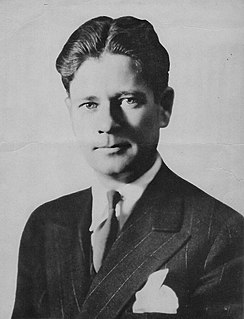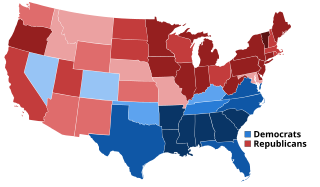Related Research Articles

Robert Marion "Fighting Bob" La Follette Sr., was an American lawyer and politician. He represented Wisconsin in both chambers of Congress and served as the 20th Governor of Wisconsin. A Republican for most of his life, he ran for president of the United States as the nominee of his own Progressive Party in the 1924 presidential election. Historian John D. Buenker describes La Follette as "the most celebrated figure in Wisconsin history".

The Progressive is an American magazine and website of politics, culture and progressivism with a left-leaning perspective. Founded in 1909 by U.S. senator Robert M. La Follette Sr. and co-edited with his wife Belle Case La Follette, it was originally called La Follette's Weekly and then simply La Follette's. In 1929, it was recapitalized and had its name changed to The Progressive. For a period, The Progressive was co-owned by the La Follette family and William Evjue's newspaper The Capital Times. Its headquarters is in Madison, Wisconsin.

Robert Marion "Young Bob" La Follette Jr. was an American politician serving as a U.S. Senator from Wisconsin from 1925 to 1947. A member of the La Follette family, he was a son of U.S. Representative, U.S. Senator and Wisconsin Governor Robert M. La Follette Sr., and father of Wisconsin Attorney General Bronson La Follette. As co-founder of the Progressive Party and ally of the Farmer-Labor Party in adjacent Minnesota, La Follette kept the Progressive Party alive in the US Senate until his defeat by Joseph McCarthy in 1946.

The Progressive Era (1896–1916) was a period of widespread social activism and political reform across the United States of America that spanned the 1890s to World War I. The main objectives of the Progressive movement were addressing problems caused by industrialization, urbanization, immigration, and political corruption. Social reformers were primarily middle-class citizens who targeted political machines and their bosses. By taking down these corrupt representatives in office, a further means of direct democracy would be established. They also sought regulation of monopolies through methods such as trustbusting and corporations through antitrust laws, which were seen as a way to promote equal competition for the advantage of legitimate competitors. They also advocated for new government roles and regulations, and new agencies to carry out those roles, such as the FDA.

Philip Fox La Follette was an American politician. He was the 27th and 29th Governor of Wisconsin, as well as one of the founders of the Wisconsin Progressive Party.

Douglas J. La Follette is an American academic, environmental scientist, and politician from the state of Wisconsin. A Democrat, he is the current Secretary of State of Wisconsin. He ran in the 2012 Democratic primary during the special election to recall Governor Scott Walker.

Alice Hamilton was an American physician, research scientist, and author who is best known as a leading expert in the field of occupational health and a pioneer in the field of industrial toxicology.

Belle Case La Follette was a women's suffrage, peace, and civil rights activist in Wisconsin, United States. She worked with the Woman's Peace Party during World War I. At the time of her death in 1931, The New York Times called her "probably the least known yet most influential of all American women who have had to do with public affairs in this country." She was the wife and helpmate of Robert "Fighting Bob" La Follette—a prominent Progressive Republican politician both in Wisconsin and on the national scene—and as co-editor with her husband of La Follette's Weekly Magazine.
Suzanne Clara La Follette was an American journalist and author who advocated for libertarian feminism in the first half of the 20th century. As an editor she helped found several magazines. She was an early and ardent feminist and a vocal anticommunist.
Progressivism in the United States is a political philosophy and reform movement that reached its height early in the 20th century. Middle class and reformist in nature, it arose as a response to the vast changes brought by modernization such as the growth of large corporations, pollution and corruption in American politics.

Edward R. Garvey was an American lawyer, politician and activist.
The Progressive Party was a political party created as a vehicle for Robert M. La Follette, Sr. to run for president in the 1924 election. It did not run candidates for other offices, and it disappeared after the election. The party advocated progressive positions such as government ownership of railroads and electric utilities, cheap credit for farmers, the outlawing of child labor, stronger laws to help labor unions, more protection of civil liberties, an end to American imperialism in Latin America, and a referendum before any president could lead the nation into war.

The Fourth Party System is the term used in political science and history for the period in American political history from about 1896 to 1932 that was dominated by the Republican Party, except the 1912 split in which Democrats held the White House for eight years. American history texts usually call the period the Progressive Era. The concept was introduced under the name "System of 1896" by E. E. Schattschneider in 1960, and the numbering scheme was added by political scientists in the mid-1960s.

Flora Dodge "Fola" La Follette was a women's suffrage and labor activist from Madison, Wisconsin, United States. At the time of her death in 1970, The New York Times quoted her on women's suffrage: "A good husband is not a substitute for the ballot." She was the daughter of progressive politician Robert "Fighting Bob" La Follette and lawyer and women's suffrage leader Belle Case La Follette, wife of playwright George Middleton, a contributing editor to La Follette’s Weekly Magazine, an actress, and, with her mother, a chronicler of her father's life.
Susan Ware is an independent scholar, writer and editor who lives in Cambridge, Massachusetts, and Hopkinton, New Hampshire. The author of eight biographies, two edited collections, and co-editor of a textbook, Ware is a specialist on twentieth century women's political and cultural history, and the history of popular feminism.

The 1924 United States presidential election in Wisconsin was held on November 4, 1924 as part of the 1924 United States presidential election. State voters chose 13 electors to the Electoral College, who voted for president and vice president.

Mira Lloyd Dock and the Progressive Era Conservation Movement is a biography of a Pennsylvania environmentalist and conservationist, written by Susan Rimby.

The 1924 United States presidential election in Kansas was held on November 4, 1924 as part of the 1924 United States presidential election. State voters chose ten electors to the Electoral College, who voted for president and vice president.
Clara Penniman was an American political scientist. She was a professor of political science at the University of Wisconsin–Madison from 1953 until 1984, and from 1974 onwards she held the Oscar Rennebohm Chair for Public Administration. Penniman was also the founder and first director of the Center for the Study of Public Policy and Administration at the University of Wisconsin–Madison, which later became the Robert M. La Follette School of Public Affairs. Penniman was the first woman to be the chair of the department of political science at the University of Wisconsin, and the first woman to be elected president of the Midwest Political Science Association. She was a specialist in taxation and public finance, publishing several books and articles on these topics.

Attempts to secure women's suffrage in Wisconsin began before the Civil War. In 1846, the first state constitutional convention delegates for Wisconsin discussed women's suffrage and the final document eventually included a number of progressive measures. This constitution was rejected and a more conservative document was eventually adopted. Wisconsin newspapers supported women's suffrage and Mathilde Franziska Anneke published the German language women's rights newspaper, Die Deutche Frauen-Zeitung, in Milwaukee in 1852. Before the war, many women's rights petitions were circulated and there was tentative work in forming suffrage organizations. After the Civil War, the first women's suffrage conference held in Wisconsin took place in October 1867 in Janesville. That year, a women's suffrage amendment passed in the state legislature and waited to pass the second year. However, in 1868 the bill did not pass again. The Wisconsin Woman Suffrage Association (WWSA) was reformed in 1869 and by the next year, there were several chapters arranged throughout Wisconsin. In 1884, suffragists won a brief victory when the state legislature passed a law to allow women to vote in elections on school-related issues. On the first voting day for women in 1887, the state Attorney General made it more difficult for women to vote and confusion about the law led to court challenges. Eventually, it was decided that without separate ballots, women could not be allowed to vote. Women would not vote again in Wisconsin until 1902 after separate school-related ballots were created. In the 1900s, state suffragists organized and continued to petition the Wisconsin legislature on women's suffrage. By 1911, two women's suffrage groups operated in the state: WWSA and the Political Equality League (PEL). A voter referendum went to the public in 1912. Both WWSA and PEL campaigned hard for women's equal suffrage rights. Despite the work put in by the suffragists, the measure failed to pass. PEL and WWSA merged again in 1913 and women continued their education work and lobbying. By 1915, the National Woman's Party also had chapters in Wisconsin and several prominent suffragists joined their ranks. The National Woman Suffrage Association (NAWSA) was also very present in Wisconsin suffrage efforts. Carrie Chapman Catt worked hard to keep Wisconsin suffragists on the path of supporting a federal woman's suffrage amendment. When the Nineteenth Amendment went out to the states for ratification, Wisconsin an hour behind Illinois on June 10, 1919. However, Wisconsin was the first to turn in the ratification paperwork to the State Department.
References
- ↑ "Nancy C. Unger". Illuminate. Santa Clara University.
- ↑ "University Place | Fighting Bob La Follette's Progressivism" – via video.pbsnc.org.
- ↑ Journal, Rob Schultz | Wisconsin State. "Author believes Fighting Bob's wife deserves to be new face of $10 bill". madison.com.
- ↑ "Nancy Unger hails California law that requires the teaching of LGBT history | History News Network". historynewsnetwork.org.
- ↑ Lorence, James J. (July 2001). "Fighting Bob LaFollette: The Righteous Reformer, by Nancy C. Unger". Book reviews. The Pennsylvania Magazine of History and Biography. CXXV (3): 293.
- ↑ Brøndal, Jørn (January 12, 2017). "FEMINIST PROGRESSIVE - Nancy C. Unger Belle La Follette: Progressive Era Reformer. New York: Routledge, 2016. xiii + 204 pp. 34.95 (paper), ISBN 978-1-138-77977-8". The Journal of the Gilded Age and Progressive Era. 16 (1): 100–102. doi:10.1017/S1537781416000530 – via Cambridge University Press.
- ↑ McNeur, Catherine (February 1, 2014). "Book Review: Unger, Beyond Nature's Housekeepers: American Women in Environmental History, by Catherine McNeur". Pacific Historical Review. 83 (1): 145–146. doi:10.1525/phr.2014.83.1.145 – via online.ucpress.edu.
- ↑ Sayer, Karen (January 2, 2015). "Beyond Nature's Housekeepers: American women in environmental historyNANCY C. UNGER". Women's History Review. 24 (1): 131–132. doi:10.1080/09612025.2014.906834. ISSN 0961-2025.
- ↑ GOWDY-WYGANT, CECILIA (2014). "Review of Beyond Nature's Housekeepers: American Women in Environmental History". Environment and History. 20 (3): 463–465. ISSN 0967-3407.
- ↑ Flanagan, Maureen A. (January 30, 2014). "Nancy C. Unger. Beyond Nature's Housekeepers: American Women in Environmental History". The American Historical Review. 119 (1): 167–168. doi:10.1093/ahr/119.1.167. ISSN 1937-5239.
- ↑ Mauldin, Erin Stewart (July 3, 2014). "Beyond Nature's Housekeepers: American Women in Environmental History". History: Reviews of New Books. 42 (3): 87–88. doi:10.1080/03612759.2014.887982. ISSN 0361-2759.
- ↑ Macdonald, Peggy (December 14, 2014). "Beyond Nature's Housekeepers: American Women in Environmental History. By Nancy Unger". Environmental History. 20 (1): 137–139. doi:10.1093/envhis/emu111. ISSN 1084-5453.
- ↑ "Nancy Unger - College of Arts and Sciences - Santa Clara University". www.scu.edu.
- ↑ "Unger, Nancy C. [WorldCat Identities]".